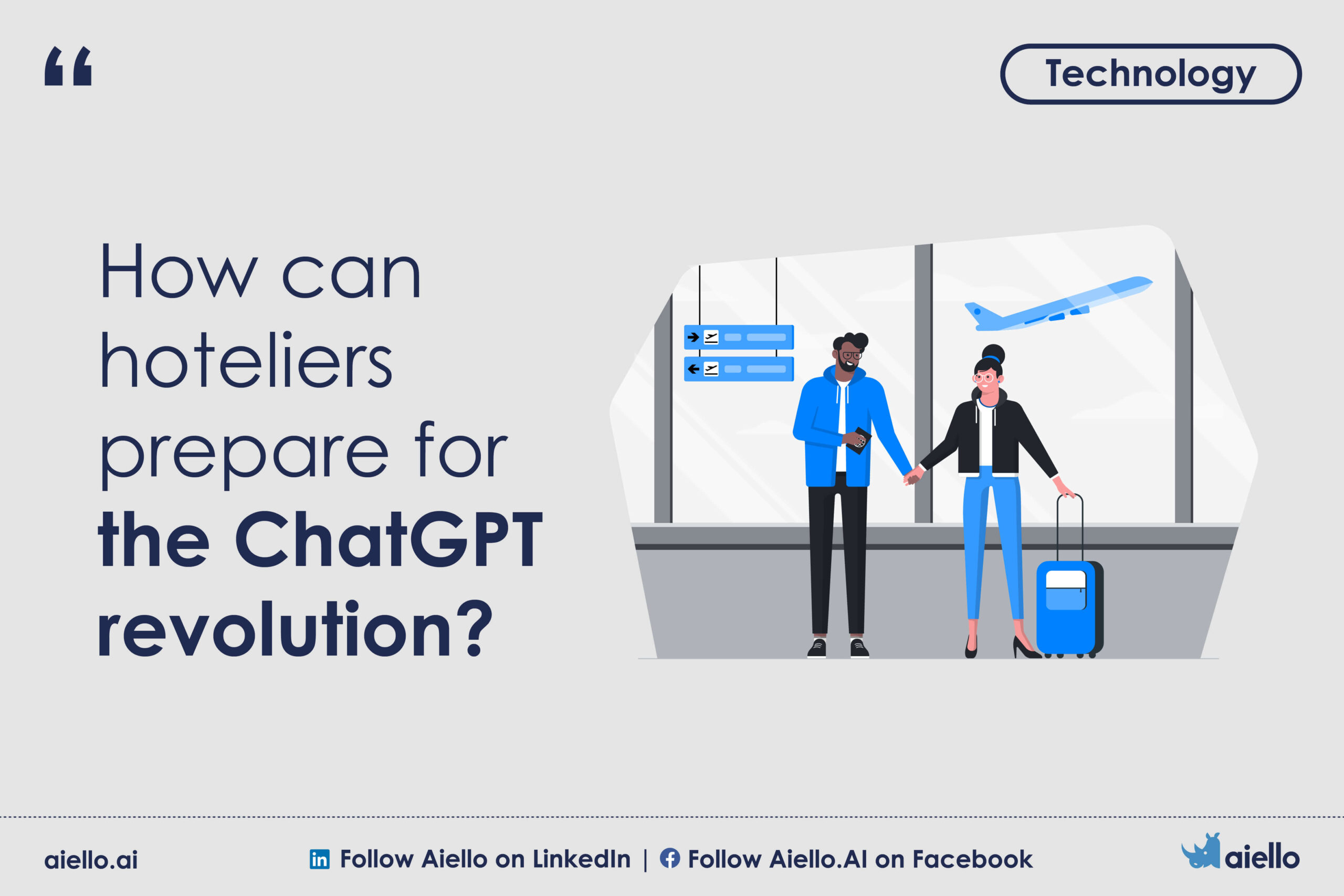

No matter what industry you’re in, you have most likely heard of ChatGPT or even tested it out yourself. Because of its human-like conversational skills in the familiar environment of an online chat, this large language model (LLM) grew in popularity at lightning speed.
This AI chatbot is about to change how we interact with information and put the reigning king of search, Google, to the test. As a hotelier, you might be asking yourself, how will this shift impact the hotel industry? When it comes to a hotel search, most customers rely on search engines or social media as their go-to channel. ChatGPT’s language abilities and user-friendly interface will make the hotel search more natural by acting like a live travel agent that chats with the customers about their plans.
Now, when this AI is in the back of everyone’s mind what does it mean for hoteliers? Can we expect a significant shift, or is this just another hype? If so, how can you prepare for this change and make the most of ChatGPT starting today?
Why is ChatGPT so smart?
ChatGPT is trained on massive volumes of data (175 billion parameters) including online texts, books, articles, and websites. Based on this voluminous data and AI algorithms it’s able to make predictions and string together meaningful responses to user’s instructions (prompts).
What can it do?
The use cases of ChatGPT are numerous ranging from information search, writing, summarizing, and editing content or code in a super-friendly conversational environment. The limits of ChatGPT are far from being reached. In the upcoming year, we can expect many companies to jump on the AI bandwagon and bring new solutions based on ChatGPT and generative AI technology.
What is prompting?
The conversation with ChatGPT always starts with giving instructions or prompting, and the outcome is based on what’s in the prompt. The better and more precise the written input is, the more exact answer the user gets. Writing good prompts is a skill that needs a lot of practice and interaction with this technology. AI Prompter, AI Wishper, and AI Prompt Engineer are new job types of the AI era and we’ll most likely see many companies looking to fill these spots in the coming months.
The technology behind ChatGPT
GPT stands for generative pre-trained transformer. Transformers are algorithms that self-learn patterns and relationships between words and help computers understand the meaning behind what was said. This technology, originally introduced to the public by Google in 2017, is a complete game-changer in the field of Natural Language Technologies.
The AI revolution is here
In the past year, we’ve seen multiple generative AI tools like Midjourney, and Jasper making waves in online communities, but ChatGPT is the first product that attracted the general public on such a massive scale. In the first 5 days, OpenAI’s chatbot gained 1 million users, and it has become the fastest-growing consumer app of all time.
ChatGPT marks a major shift for search engines like Google Search, which are now racing to be the first to add conversational AI to an online search. ChatGPT with other generative AI tools started the AI revolution. In 2021, the market size for generative AI was over 7 billion USD, and it is expected to surpass 110 billion USD by 2030, with a growth rate of 34.3% per year.
One thing is certain, generative AI is here and it’s going to reinvent what we care about the most – customer behavior. For hotel businesses, putting in the time and keeping up with the latest technologies has never made more sense than now. It is essential to stay up to date with what the customer wants, how they find you online, and their changing standards.
So without further ado, here’s what hoteliers can expect from the ChatGPT revolution, how it will affect the industry in the future, and what you can do to prepare for this shift now.
Online search has been monopolized by Google, dominating the search engine market with a 91.9% share and the keyword ranking framework. When it comes to travel planning, people have learned to plan trips and hotel stays by using keywords to filter the search results. Until now Google’s superior position was unchallenged, but ChatGPT has the potential to change that completely.
On February 6, Microsoft, the largest shareholder of OpenAI, announced integrating ChatGPT functionality in their search engine Bing, and on the same day, Google unveiled the integration of their latest conversational AI, Bard. We’re confident that this is just the beginning of the search revolution and we’ll be seeing more changes in the coming months.
ChatGPT will revolutionize how people search online, find hotels and plan their journey. Interactions will be much more natural and complex and, as we mentioned before, the role of ChatGPT in the travel search will be more of an online travel agent.
When planning their trip with Google Search, user types in keywords ex. ‘trip with my girlfriend in Tokyo anniversary hotels’ in the search engine. The engine lists different results from the ‘10 Best romantic hotels in Tokyo’ to specific hotel websites. The user needs to sift through pages of results and click on the ones that are most relevant; usually going over multiple sources, blogs, web pages, and online reviews before they make a decision. If the user hasn’t found what they were looking for, they need to start over and type in new keywords.
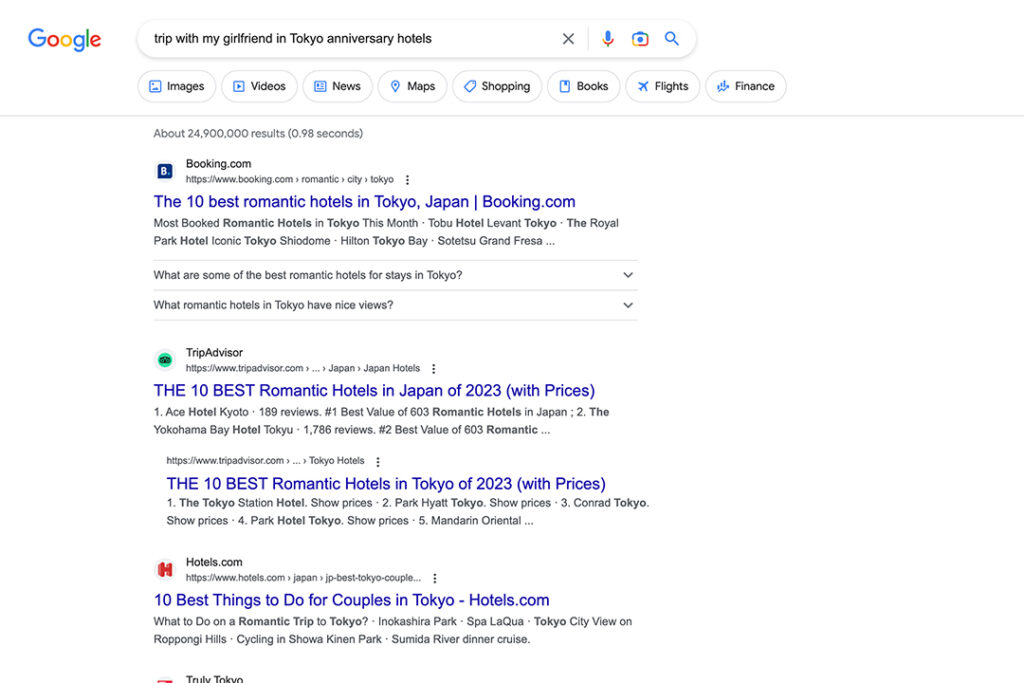
ChatGPT takes the hotel search one step further by doing the research for us. After the user keys in their query, ‘I’m planning a trip to Tokyo next month with my girlfriend. Any idea where I should stay? I’d love to surprise her with a nice romantic night for our anniversary’.
Then the AI reads all information available on this topic, and puts together a response with several options in a matter of seconds; each telling the user a bit more information that helps them make a decision ‘Tokyo is a vibrant and exciting city with many options for accommodations that can provide a romantic and unforgettable experience for your anniversary. Here are a few suggestions:’
If the user is not satisfied with the result, the journey continues as a conversation with ‘I’d like a more boutique hotel feeling best for young couples and quite on a budget’ and they can continue to tweak the prompts to personalize the results to their preferences.
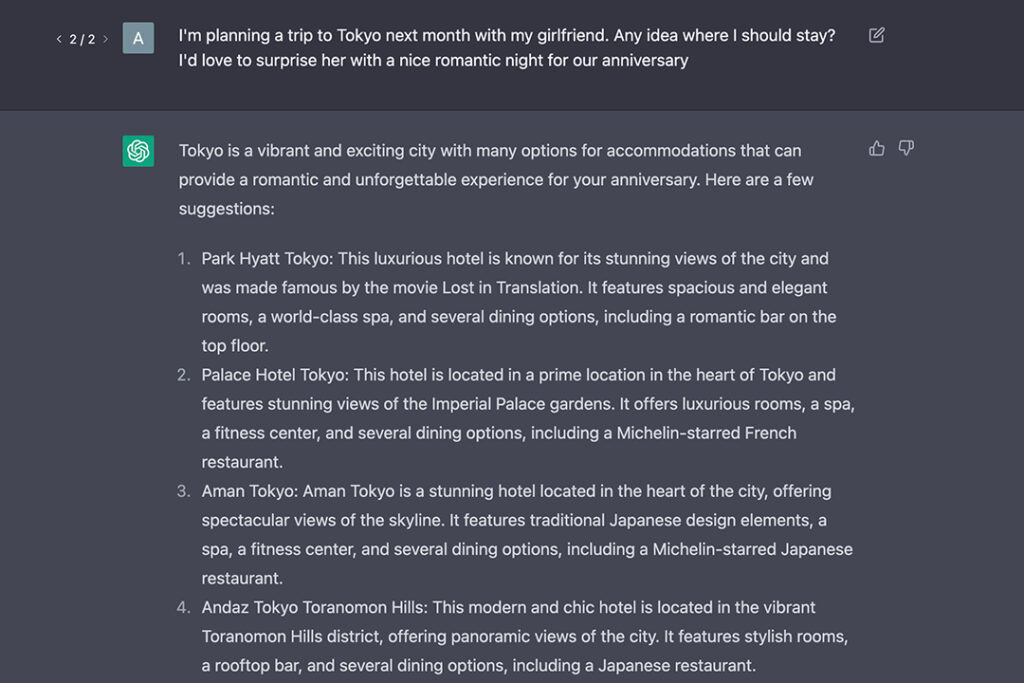
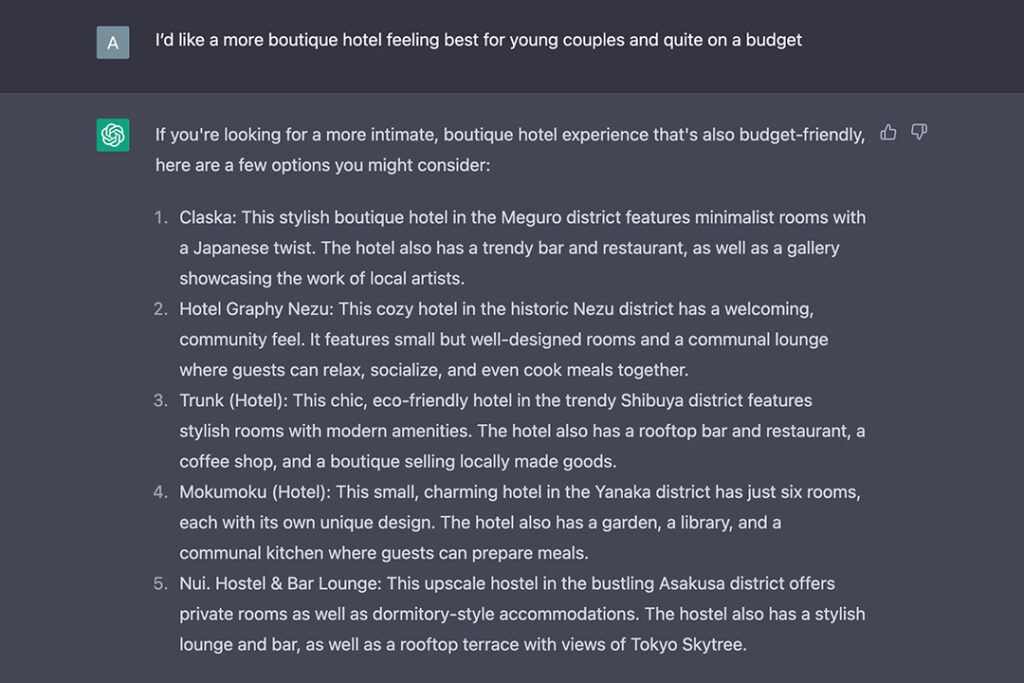
How can hotels prepare for this change?
Understanding how travelers interact with this new technology will be the key driver for hotels’ success in an online search. Hotels will need to closely follow the evolution of search habits and find ways to stand out. Experts predict that in addition to search engine optimization (SEO), hotel websites might also need to be adjusted to the liking of AI tools such as ChatGPT.
What can we expect in the future?
Another major strength of ChatGPT-like technology will lie in guest journey orchestration, where multiple travel agents will work together to create a better journey throughout multiple touchpoints. This is a missing piece not only in the hotel space but in the travel industry as a whole.
‘When you’re beyond the notion of a flight disruption at the airport, what can I do at the airport? Can you tell me what I can do in the next 45 minutes? I think it is super exciting for the consumer, this concept of personalization.’ said Rajesh Naidu, Expedia Group, Senior Vice President and Chief Architect. (Source:)
For hotels, using digital solutions based on ChatGPT-like technology will be a way to create new interfaces and channels to showcase their facilities, upsell and personalize their services.
Vendors are already working on integrating ChatGPT-like interactions into their solutions. This can apply to any kind of interactive solution, but pairing this AI with a voice interface takes the digital guest journey to another level.
ChatGPT is setting a new standard for Voice AI interactions with humans. As guests become more used to this, their expectations for interacting with chatbots and voice assistants will be higher. Guests will expect their hotel digital experience to feel natural and seamless and their intentions to be understood. Natural language technology will become the new norm for every interaction with software or tool.
How can you prepare for this shift today?
When choosing hotel technology, prioritize a natural digital experience, meaning the interface that has minimum obstructions or steps to get to work. Voice-based interactions provide the most natural way for humans to interact with technology and Voice AI solutions working on ChatGPT standards will make a real difference for your guests. Anything else will look outdated.
What can you expect in the future?
The biggest value of ChatGPT will be personalization. Each traveler has different preferences, and needs and generative AI can help hoteliers create new and more personalized experiences. Today’s technology already offers a level of personalization driven by historical data on traveler behavior that builds different customer personas.
In the future, we can create a curated guest journey where we actually identify destinations, hotels, flights, and activities based on the customer’s personal preferences. Hotels will be able to use digital assistants to give guests tailored recommendations that help them make the most out of their travel and boost the entire itinerary experience.
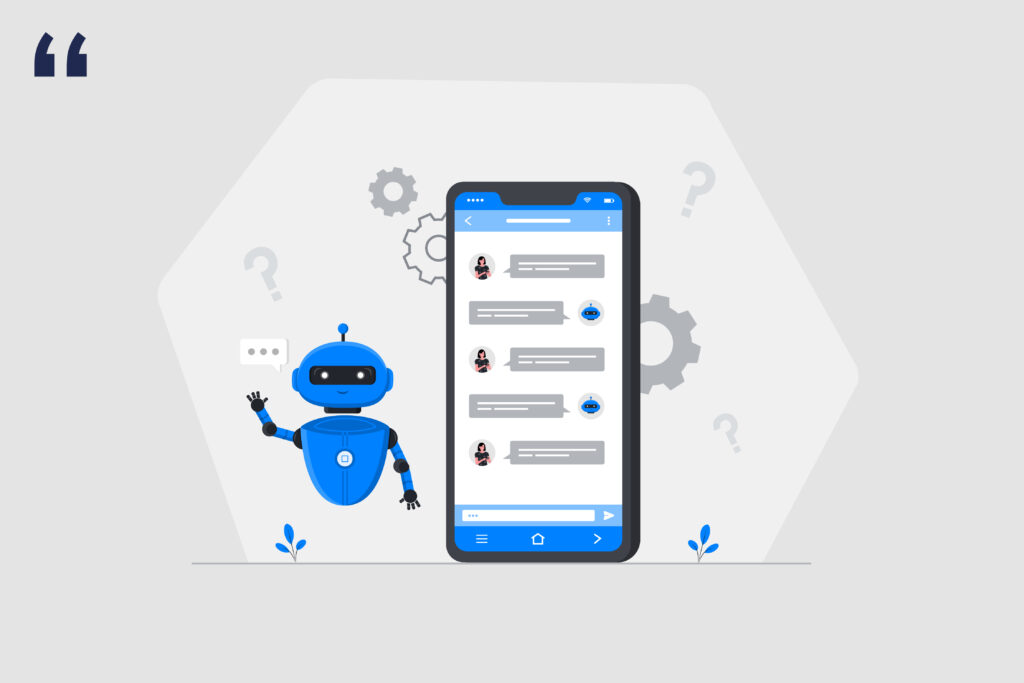
By now we only talked about the future possibilities with ChatGPT, but you can already try to implement this technology in hotel marketing and sales practices today. Here is how.
Guests today are not just looking for a room, they want a wholesome experience where they can get tips and recommendations from a knowledgeable source – you. It’s no news that a decent website listed on Google, with good copy, imagery, and a few informative content pieces is the key to attracting new customers.
ChatGPT can write SEO-friendly blog articles for your hotel website, compelling marketing, and website copy that will attract more people to your property. This helps you showcase the best of what you offer, position yourself as an expert on the destination, and clearly communicate your service offerings to the promising customers that are browsing your website.
Have you as a hotelier already tested out the capabilities of ChatGPT in your daily routines, such as e-mail communication with your guests? If you have tons of ongoing conversations with the customers, and only a few staff members, your staff can use ChatGPT to write these messages faster and even personalize them based on just a few parameters given in the prompt.
In the future, thanks to advanced language processing capabilities ChatGPT will analyze vast amounts of customer feedback data, helping hotels to gain insights into customer preferences and pain points. You can then use this data to base your decisions about products and services, make improvements to the customer experience, and find the best way how to market your offerings to your guests.

The future of AI technology is limitless, with endless potential for impacting every industry, including hospitality. The potential of ChatGPT and similar generative AI tools is exciting, and businesses should prepare themselves to take full advantage of the opportunities that they present.
However, while the benefits are undeniable, it is important to be aware of the drawbacks. One potential issue is that AI will provide biased recommendations for the users and try to sway them in the wrong direction. To ensure that AI is used in the best interest of consumers, regulations, and human oversight must be put in place.
Therefore, hotels and other businesses in the hospitality industry should stay informed and prepared to embrace AI and offer digital experiences that are natural for the users while being mindful of its possible limitations.
With its potential to streamline and personalize marketing and customer service processes, ChatGPT and similar technologies will be an exciting enhancement for hotels looking to stay ahead of the competition and enhance their bottom line.
Are you looking for free expert insight on using AI at your hotel? Get in touch with our team and we’ll help you explore further.
Do you want to learn more about voice AI technology for hotels? Sign up for a free demo.